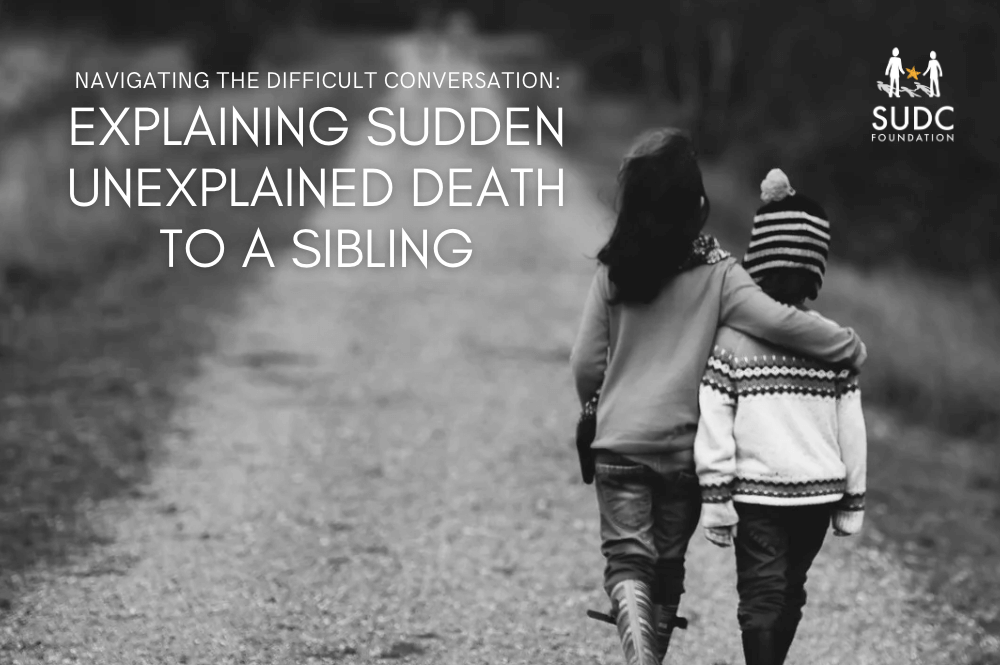07 Jul Navigating the Difficult Conversation: Explaining Sudden Unexplained Death to a Sibling

Written By: Amanda Brindle, LSW, Associate Manager of Family Services
Losing a child is an incredibly challenging experience, and when it comes to explaining sudden unexplained death to a surviving or subsequent sibling, the task becomes even more complex. Children at different developmental stages process and understand death in varying ways, which means that the conversation and their comprehension will evolve over time. In this blog, we will explore the importance of considering developmental differences when explaining sudden unexplained death to a sibling and provide practical advice on how to approach the conversation, address sleep-related concerns, alleviate anxieties, and navigate feelings of guilt.
Children of different ages have distinct cognitive abilities, emotional comprehension, and language skills. It is crucial to take these factors into account when explaining sudden unexplained death to a sibling. Here’s a breakdown of some practical advice tailored to different age groups:
1. Preschoolers (ages 2-5)
- Use simple and concrete language to explain death, such as “Their body stopped working, and they won’t come back.”
- Reassure them that their sibling’s death was not their fault.
- Encourage them to express their feelings through drawing, play, or storytelling.
2. Elementary School-age Children (ages 6-12)
- Provide honest and age-appropriate information about death, avoiding complex medical or scientific explanations.
- Answer their questions truthfully, even if it means acknowledging uncertainty.
- Reassure them of their own safety and address any fears or concerns they may have.
3. Adolescents (ages 13 and older)
- Allow them to take an active role in discussions and decision-making regarding funeral arrangements or memorials.
- Acknowledge and validate their intense emotions, including guilt, anger, or sadness.
- Encourage them to seek support from trusted adults, peers, or grief support groups.
In the case of sudden unexplained death, where many instances occur during sleep, parents and siblings may develop anxieties surrounding sleep and bedtime. It is important to address these concerns and provide reassurance:
1. Acknowledge Anxiety
- Let both parents and siblings know that it is normal to experience anxiety after such a tragic event, especially related to sleep.
- Emphasize that worries about sleep and safety are understandable reactions to loss, as it can take time to process and heal.
2. Open Communication
- Encourage parents and siblings to openly discuss their fears and concerns related to sleep.
- Provide a safe space for them to express their emotions and ask questions.
- Reassure them that their worries are valid and that it is okay to seek support when needed.
3. Professional Support
- Start the discussion with your pediatrician or consult healthcare professionals who specialize in grief counseling or anxiety management. They can provide valuable guidance and strategies tailored to your child’s specific needs, helping to alleviate anxiety and improve sleep patterns. These professionals are experienced in supporting families through the challenges of grief and can offer valuable insights and resources. By working together with trained professionals, you can ensure that your child receives the best possible support and care during this difficult time.
Guilt is a common emotion experienced by surviving siblings. It is important to address these feelings and provide reassurance:
1. Normalize Guilt
- Let the sibling know that feeling guilt after such a loss is a natural reaction.
- Explain that in tragic events like sudden unexplained death, there is no one to blame. It was a heartbreaking circumstance beyond anyone’s control.
2. Encourage Self-Compassion
- Help the sibling understand that they did nothing wrong and that it is important to be kind to themselves.
- Remind them that they are not responsible for their sibling’s passing and that the focus should be on healing and honoring their sibling’s memory.
3. Promote Emotional Expression
- Encourage the sibling to express their guilt and other emotions through writing, artwork, or talking with a trusted adult or counselor.
- Provide opportunities for them to share memories and talk about their sibling, fostering a sense of connection and love.
Explaining sudden unexplained death to a surviving or subsequent sibling requires sensitivity, tailored explanations, and ongoing support. By addressing their developmental differences and providing age-appropriate explanations, we can help them understand death and navigate their grief. Supporting them in managing sleep-related concerns, alleviating anxiety, and addressing feelings of guilt is crucial. It’s important to offer continuous support, open communication, and access to professional resources when needed. With love, empathy, and understanding, we can guide them through this challenging journey and help them find strength in honoring their sibling’s memory while fostering their own growth and healing.


